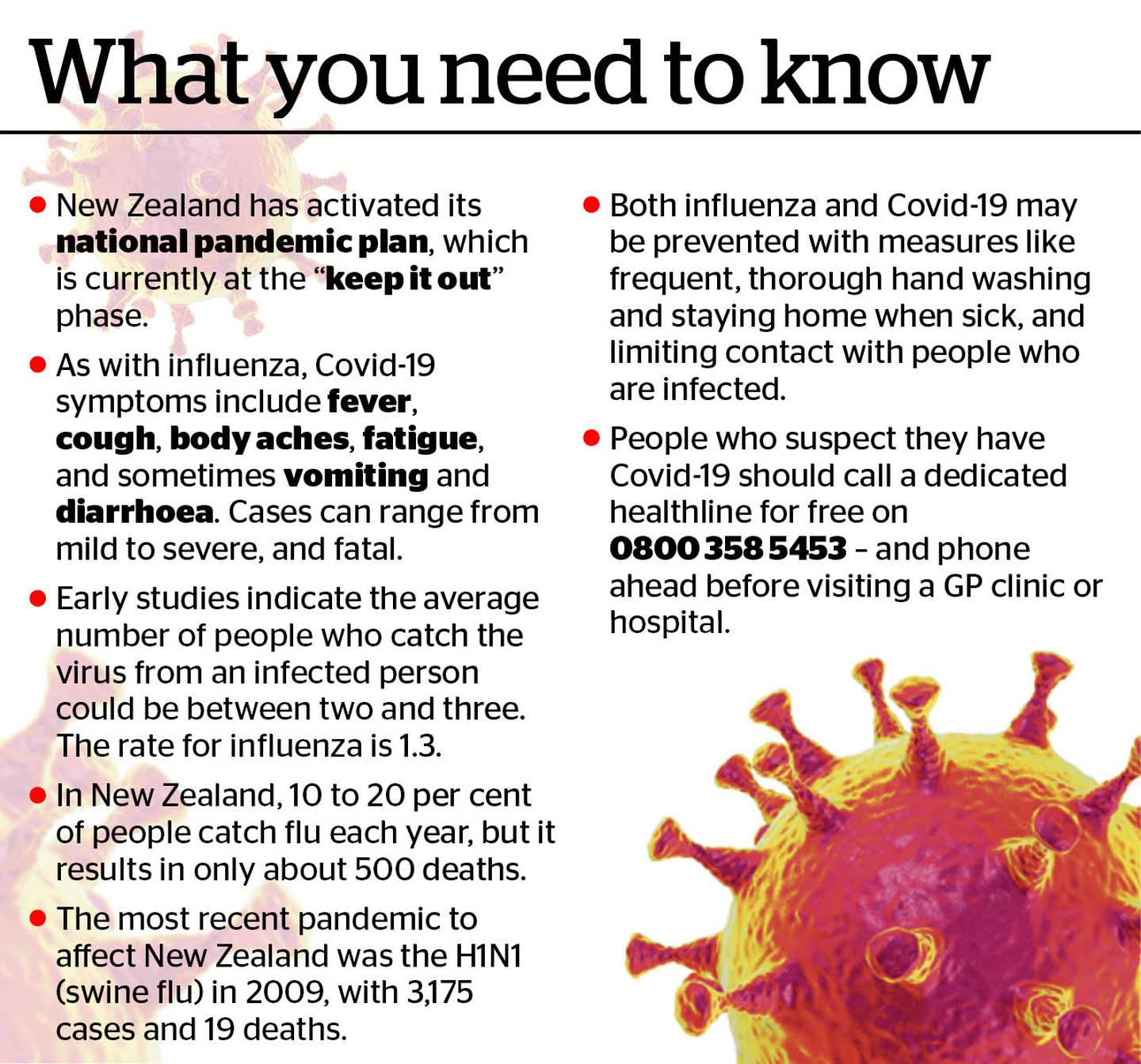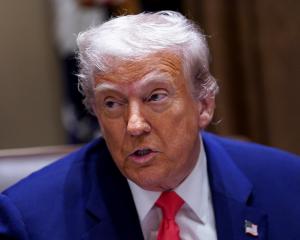Gatherings of more than 500 people should be cancelled to help stop the spread of coronavirus, Prime Minister Jacinda Ardern said today.
Within the next month, she said there were 107 events expecting more than 1000 attendees were expecting to take place in New Zealand's major centres - but the Government had to protect the public from Covid-19.

This applied to non-essential events including sporting and religious events, but excluded school or university events.
Today's announcement would give certainty to event organisers, but further guidance on public gatherings would be announced further in the week, she said.
"Ultimately I know this decision is hugely disappointing. I know it will have an impact on a number of communities ... but we are making this decision in the best interest of New Zealanders."
The Government was not shutting schools or universities because "that is not where New Zealand is at".
Ardern said there was no plan at this stage to cancel any school holidays.
She said people should reduce close contact in places like movie theatres, but that was impossible for music festivals and they should be cancelled.
The guidelines, out before the end of the week, should give certainty for events like large weddings.
Gatherings of people under 500 could be allowed "under certain circumstances", she said, such as where close contact can be avoided.
- Passengers ditch cruise ship in Dunedin
- Queenstown coronavirus patient 'well-known', part of film crew
- Coronavirus: Reserve Bank slashes OCR to record low
- Resort businesses await Govt help details
- Commercial-scaled sport collapses
- Precautions at medical centre
- Schools seek talks on possible closures
She said she spoke to her Australian counterpart Scott Morrison at the weekend before she announced new travel restrictions, but there was no scientific basis to allow trans-Tasman travel because there was community transmission in Australia.
Social distancing was the "new normal" and should apply to everyone's actions, including visiting bars and restaurants.
She said the tourism sector were "craving" certainty around travel restrictions, but those would be reviewed in a fortnight and an extension was likely, given the current spread of the virus.
She said there would be "zero-tolerance" for travellers who did not self-isolate.
Ardern said the first phase of the Government's coronavirus response, to be announced tomorrow, would focus on keeping Kiwis in work.
A mass public awareness campaign to unite against Covid-19 would be launched on Wednesday, she said in her weekly post-Cabinet press conference.
That emphasised the importance of New Zealand's new travel restrictions, she said.
Slowing the transmission of Covid-19 was the best way to secure the economy in the long run, she said.
"We are working around the clock to ensure our economic package will focus relentlessly on jobs."
It would also give the health system the resources it needs.
She said preliminary advice from Treasury this weekend was that the impact could be greater than the impact of the GFC.
"There is no existing playbook for the economic response here."
The Government was prepared for "this rainy day".
Fines possible
People who refuse to self-isolate during the coronavirus crisis could be fined, health officials say.
Australia is considering fining those who failed to follow self-isolation requirements and Director-General of Health Ashley Bloomfield confirmed this country was also considering such an enforcement move.
Bloomfield made the comments during today's coronavirus update during which he confirmed there were no new cases.
He also confirmed a passenger on board the Golden Princess which stopped in Dunedin on Saturday, who was suspected to have the virus, has tested negative for Covid-19.
Bloomfield said the prospect of fines were being discussed at Government level and the issue had been raised with the Attorney General's office.
"We are doing this to ensure New Zealand and New Zealanders are protected from having a severe impact from Covid-19," Bloomfield told reporters this afternoon.
All tourists who arrive in New Zealand will have to outline their self-isolation plan - and if it not good enough they could be refused entry.
Queensland officials say those who arrive in the country and refuse to follow self-isolation requirements could be fined up to $13,000. Police could also check if the requirements were being honoured.
There are no new coronavirus cases in New Zealand today, with the total remaining at eight.
As of this morning New Zealand had eight confirmed coronavirus cases.
Tourists who come to New Zealand and were travelling around in a campervan should not be using shared campground facilities or visiting popular tourist destinations, Bloomfield said.
Anyone who arrived from a country where there was an outbreak of Covid-19 should be self-isolating, even if they arrived back in New Zealand before this morning's 1am enforcement of travel restrictions.
A total of 1000 tourists arrived at Auckland Airport this morning, Bloomfield said, and on a typical Monday morning that number was usually over 2000 - so there had already been a significant reduction, he said.
All travellers coming to New Zealand need to be able to demonstrate what their self-isolation plan was, Bloomfield said.

"If they're not able to demonstrate that, or we're not satisfied with their plan, we will facilitate in making arrangements for them to fly back to where they came from."
Health officials revealed yesterday that two more confirmed coronavirus cases had emerged - one in Wellington and one in Queenstown. Both involved travellers from overseas who were self-isolating.
The Wellington case, a dance teacher from Townsville, was symptom-free and remained self-isolated in a hotel room, Director-General of Health Dr Ashley Bloomfield said today.
The Queenstown case, a woman in her 30s, was in monitored self-isolation after being discharged from hospital.
Contact tracing on the two new patients' flights has been changed to two seats in all directions from the confirmed case - in front, beside, behind and diagonal.
Healthline knew the relevant seat numbers for all the flights with confirmed cases on board and would contact those people who need to self-isolate.
The health call centre was dealing with heavy demand from callers at the weekend and should not be contacted for travel information.
Bloomfield said a passenger on the Golden Princess cruise ship at Akaroa yesterday had tested negative and the cruise ship has returned to Melbourne.
The other cruise ships in New Zealand waters all have health staff on board and were cleared of any health concerns before arriving in New Zealand.
Bloomfield encouraged New Zealanders to welcome those tourists on board.
He also thanked the thousands of people undergoing self-isolation.
"I have great confidence in the trustworthiness of the many people to be doing this for the benefit of all New Zealanders," he said.
"You can still enjoy biking or walking or running, of course alone... you should avoid having visitors to your home.
"You can use public transport for the sole purpose of getting to your home, but you should not after."
Bloomfield said you should minimise the time you spent in shared spaces in homes, such as bathrooms, living rooms and kitchens. Beds and linens should not be shared.
Travel restrictions kick in today
Meanwhile, the Government's tough travel restrictions kicked in at 1am this morning requiring any international traveller arriving in New Zealand to self-isolate for 14 days. Only Pacific nations are exempt.
Air NZ then unveiled plans to cut international capacity by 85 per cent in the next few months.
Earlier today the Reserve Bank cut the official cash rate to 0.25 per cent and warned of the "severe impact" coronavirus would have on this country's economy.
Meanwhile University of Otago public health professor Michael Baker has warned the public to not expect the coronavirus pandemic to be over by Christmas.
New Zealand was set for a long, drawn-out battle with the virus as different waves of the pandemic hit separate countries at different times.
Tough travel restrictions that began at 1am today would buy New Zealand invaluable time in the fight, but the complicated spread of the virus elsewhere meant it would keep knocking at our door, Baker said.
He urged Kiwis and businesses to embrace travel and social restrictions as the new normal.
"Anyone who says it will be over by Christmas hasn't thought about it enough," Baker said.
"I mean which Christmas, this one, or Christmas next year?"
Complicating the virus' spread was the different ways different countries had chosen to tackle it.
New Zealand was one of the few regions - along with the likes of Taiwan, Singapore and Hong Kong - still intent on containing and stamping out the virus before it spread.
In Europe, where more than 1500 people had already died, many Governments had accepted they could no longer contain the virus.
Comments
So many questions for the Govt. What about the couple of backpackers interviewed today who said they didn't care about self-isolation and were just going to carry on with their holiday driving a van around NZ regardless? These people are selfish at best and potential killers at worst. How can camper van companies keep hiring out their vehicles if people are supposed to be self-isolating? You can't drive round a country without stopping for petrol or food or using other services. No-one in a camper van can be self-isolating, so how can these companies keep operating? Same goes for backpackers accommodation, motels, etc. By taking bookings from recently arrived travellers they are potentially colluding with those people in breaching the self-isolation requirement. All travellers attempting to buy goods or using services anywhere in NZ should be required to show their plane tickets to establish exactly when they arrived. If it's within the self-isolation period, the police should be called. End of problem.
Self isolation good. Agree with Dakota that some controls and measures need to go alongside that.
Cancelling public events, not so sure given we have not yet had a case of community transmission. If we stop it at the borders shouldn't life be able to continue semi normally within our little haven.













